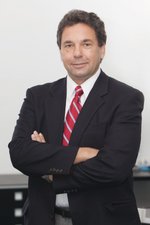
Dear Readers,
Many thanks for your interest in the research results of our university.
How do we measure the success of academic or scientific research? Do we take success in research and development as our yardstick? Or should a university like the University of Duisburg-Essen (UDE), which with over 30,000 students in eleven faculties is amongst the largest in the country, look to the link between research and teaching as a measure of its success? The UDE is successfully doing both. For us, as one of the largest teacher training centres in North Rhine-Westphalia, the close connection between university teaching and independent, autonomous knowledge acquisition - research and teaching, in other words - has special significance. Creating knowledge, free of economic constraints and political interests, is the ultimate goal of every academic institution. Regrettably, in a research environment that is driven by performance parameters, this goal is difficult to defend or uphold. Like all modern and innovative universities, the UDE has squared up to the challenge in a forward-thinking, constructive way and established five Main Research Areas. The university's performance can thus be illustrated in many areas on the basis of parameters such as research funding, successful participation in major consortium projects, publishing activities, and organisation of leading international conferences on the three campuses.
Please allow me to present just a few examples. According to the latest Funding Ranking (2005-2007) conducted by the German Research Foundation (DFG), our university leads the field in a number of disciplines, including statistical physics and non-linear dynamics at the top of the nationwide list, together with condensed matter physics and water research in fifth place. The Faculty of Mathematics made an important addition to its team in 2009 with the appointment of Prof. Dr. Marc Levine, a US mathematician with a worldwide reputation, to the UDE as Humboldt Professor. Almost simultaneously, young mathematician Dr. Moritz Kerz chose our university as the location for his Emmy-Noether Research Group. The Centre for Medical Biotechnology (ZMB) and the Faculty of Medicine were also successful in applying for an international Transregio research consortium from the DFG. In 2009, the total amount of third-party funding granted to the university doubled by comparison with the average of previous years.
I would like to draw particular attention to a major milestone for the University of Duisburg-Essen, the award for construction of the "NanoEnergieTechnikZentrum (NETZ)" with over 40 million euros of funding. Under lead management by our Center for Nanointegration Duisburg-Essen ( CeNIDE ), a unique research facility for more than 100 physicists, chemists and engineers is being established to combine nanosciences with sustainable energy technology and innovation and to bridge the laboratory-industry gap in the manufacture of nanomaterials for energy technology applications.
Alongside all these parameter-related examples of our activities, another part of the university's work in research is to help prepare up-and-coming scientists and academics for a lead role in future economic, social and technological innovation. To do this, we have introduced an interfaculty forum for doctoral researchers (Profor). The events organised by the forum offer the more than 1800 doctoral candidates at our university a chance to look beyond their own field and acquaint themselves with other academic or scientific cultures and methods. Profor provides practical support, for example with preparing research funding applications or developing communication and team leadership skills, but also addresses more fundamental issues such as the moral responsibility of knowledge acquisition and good scientific practice.
The current report presents a selection of our main activities in research and teaching and also in research and development from 2009 and introduces some of the institutes at the University of Duisburg-Essen (UDE). A more general description of the internationally recognised research taking place in our eleven faculties, ten interdisciplinary research institutions and eleven associated institutes is provided in the Research Report 2008. One thing is certain: true to its "3 campuses, 2 cities and 1 university", the UDE is ready to assume a key role in networking research activities within the Rhine-Ruhr region.
I would like to wish you an enjoyable, informative read and hope that you are as captivated by the research at the University of Duisburg-Essen as our researchers, to whom I wish to express my gratitude for their excellent, forward-looking work. Even at this early stage, I can already confirm that the UDE success story is set to continue in 2010, a year which began with the successful acquisition of various major projects in e-mobility, logistics and urban systems. I hope you will continue to follow these and other interesting developments at our university.
Yours sincerely,

